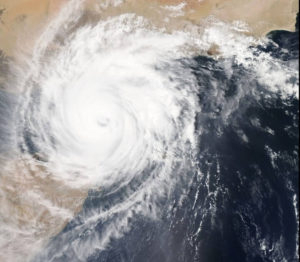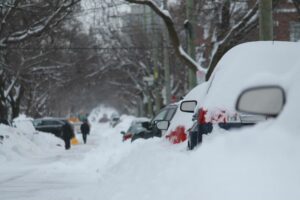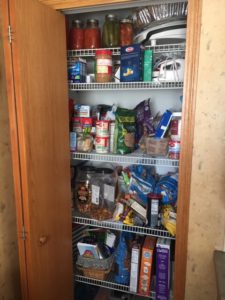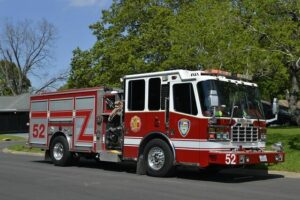Why Prepare
There is no doubt that COVID-19 continues to dominate our daily lives. For the first time, many of us were confronted with something we never expected to see; completely empty store shelves.
The worldwide pandemic has certainly uncovered some uncomfortable truths about many of our approaches to prepping and surviving emergencies. It just goes to show just how important it is to be prepared to survive any emergency situation.
Yes, many have joked about stores selling out of bread, milk, water, and even batteries before snowstorms or hurricanes. But this situation is certainly different. Thanks to the COVID-19 pandemic, the vast majority of us are coping with some type of shortage.
Like you, I’m trying to navigate these crazy times we’re currently experiencing. Keeping my family safe and prepared has always been my top priority. Fortunately, our family has been prepared for any unforeseen emergencies; we have plenty of food, water, and paper products to last us for at least a couple of months if necessary.
Even though these are difficult times, we WILL get through them.
The urgency to be prepared to survive any disaster or emergency situation is now more evident than ever before. There are countless ways that your family can be affected by unforeseen adversity that would require emergency preparation. For many, just the thought of making the necessary preparations can be a bit overwhelming. 
According to DisasterAssistance.gov, “Evacuations are more common than you might think. Fires and floods are the most frequent causes. Almost every year people along coastlines evacuate before hurricanes.” They also include the following reasons to evacuate; “Chemical threats can come from things like terrorist attacks and industrial or transportation accidents. Threats can even come from the products you use at home.”
According to an April 2015 FEMA survey, only 39% of the respondents have an emergency plan that they have discussed with their household. In a report by The Washington Post, nearly 80 percent of the U.S. population live in counties that experienced at least one weather-related disaster since 2007.
Personal Experience
The most recent experience was, of course, the COVID-19 pandemic. Our family was well prepared for an emergency, with all the necessary essentials to live comfortably for 60 to 90 days. I felt pretty confident we would be okay with the basics but what I didn’t account for was keeping our sanity while in lockdown. We learned early on the importance of becoming much closer and treating our time together as if every day was a holiday. Plenty of games, puzzles, and communication. Not too bad after all.
I have had experience with weather-related issues as well. My family was without power for over a week when tens of thousands were without power because of terrible weather conditions. In the backyard of our neighbor’s house, an electrical pole snapped off when a large branch fell. The electric company’s first goal was to restore power to as many residences as possible. The difficult repairs, as in our case, were low on the priority list. Fortunately, I had a generator to keep our necessities going. I was even able to provide power to one of our neighbors.
What’s more, my family has experienced what is like to not have power in the middle of winter for a couple of days. The generator came in handy once again. To keep us warm, I used a kerosene heater with good ventilation along with electric heaters. I was definitely happy that I had the heating units to get us through the situation. We also have plenty of emergency blankets if they were needed
When I was just a kid in Michigan we had a snowstorm that kept us inside for three days. My parents were always prepared for such situations. That’s where I first learned the importance of preparation and being prepared for anything that could happen, especially without notice. Although, for myself and my brother it was quite a fun time as we ventured to the backyard, fired up our dirt bikes, and had a blast.
Where To Start
As mentioned, the thought of having to prepare for a week or possibly months without power or a reliable food and water supply can be quite overwhelming. It’s incredibly important to be prepared for any situation or disaster and I believe that it is crucial to prepare for the emergencies that can happen in your immediate area. I’m mainly referring to weather issues that cause power outages, flooding, or any other unforeseen issues that can keep you in your home for a few days to a week or two.
There have been studies showing it’s possible to survive up to 3 weeks without food but I know for sure I’m not planning to test that theory. Most people have enough food in their pantries to last at least three days. You may not like what you find but it should sustain you for a few days.
Then there is the importance of having an adequate supply or source of water. In comparison to survival without food, studies show that you can only survive about 3 days without water depending on individual situations. In preparation, I went out and purchased enough water (1 gallon per person/day) to last us at
least 30 days. When keeping this much water on hand it’s important to condition the water as well as rotate the supply. I also have a number of portable water filters as a backup. You never know!
When I first started building up our supply, I first wanted to make sure my family was prepared to survive for at least 3 days in case of a weather-related emergency. I then decided to break our long-term preparation into smaller goals. It is much simpler and far less stressful than thinking about how I was going to gather enough food and water for an extended period of time. Here are the short and long-term goals I went with.
Goal #1 – 72-hour kit
Goal #2 – The short-term 1-3 week preparation
Goal #3 – The midterm goal 3 – 6-month preparation
Goal #4 – Long Term Goal 1 year plus preparation
If you’re reading this, you no doubt want your family to be prepared to survive any emergency. Taking your preparation seriously is an important first step to overcoming, what may seem like, a daunting task but you can accomplish it. Reaching your preparation goals in smaller bite-size chunks is the way to go.
What’s Next
Now that you have your food storage plan of action and a reliable source of water, both of which are key ingredients in preparing your family, you can begin to develop your survival skills. I’m not necessarily referring to wilderness survival. There are plenty of areas around your home that may need to be improved upon and emergency plans that need to be put into place.
A disaster can happen at any time, without warning. Do you have a plan for your family if everyone is away from home? It is important to have a family plan so that your kids and elderly members know where to meet and who to call if you can’t be reached.
Have a family meeting to ensure everyone understands the importance of what to do in an emergency situation. Ready.gov has some great information to assist you in developing a full-proof family plan.
In the event there is a fire, it’s just as important to have a plan in place. Some questions that should be asked are; if there’s a second floor, does each room have a compact escape ladder? Are there good sturdy shoes by the beds? Does everyone in the home know fire safety rules? This is an important area to focus on in your survival preparation. The Red Cross has some great information on fire safety.
In Conclusion
With the recent pandemic, it’s imperative that you get your preparation plan together and take the steps to keep your family safe. As mentioned above, just the thought of preparing for any number of emergency situations that could occur can be a bit overwhelming. The good news is, once you begin preparations, you will have the confidence and comfort in knowing that you are gaining the knowledge to protect your family should the need arise.
Keep in mind that all the areas in need of preparation listed above will not be achieved overnight. There are additional areas of importance, like financial planning and having items for bartering, that you can learn as you increase your survival knowledge.
In future posts, I’ll be addressing all of the areas that will enable you to be prepared to survive any emergency or disaster situation. Keep the faith and continue moving forward.

